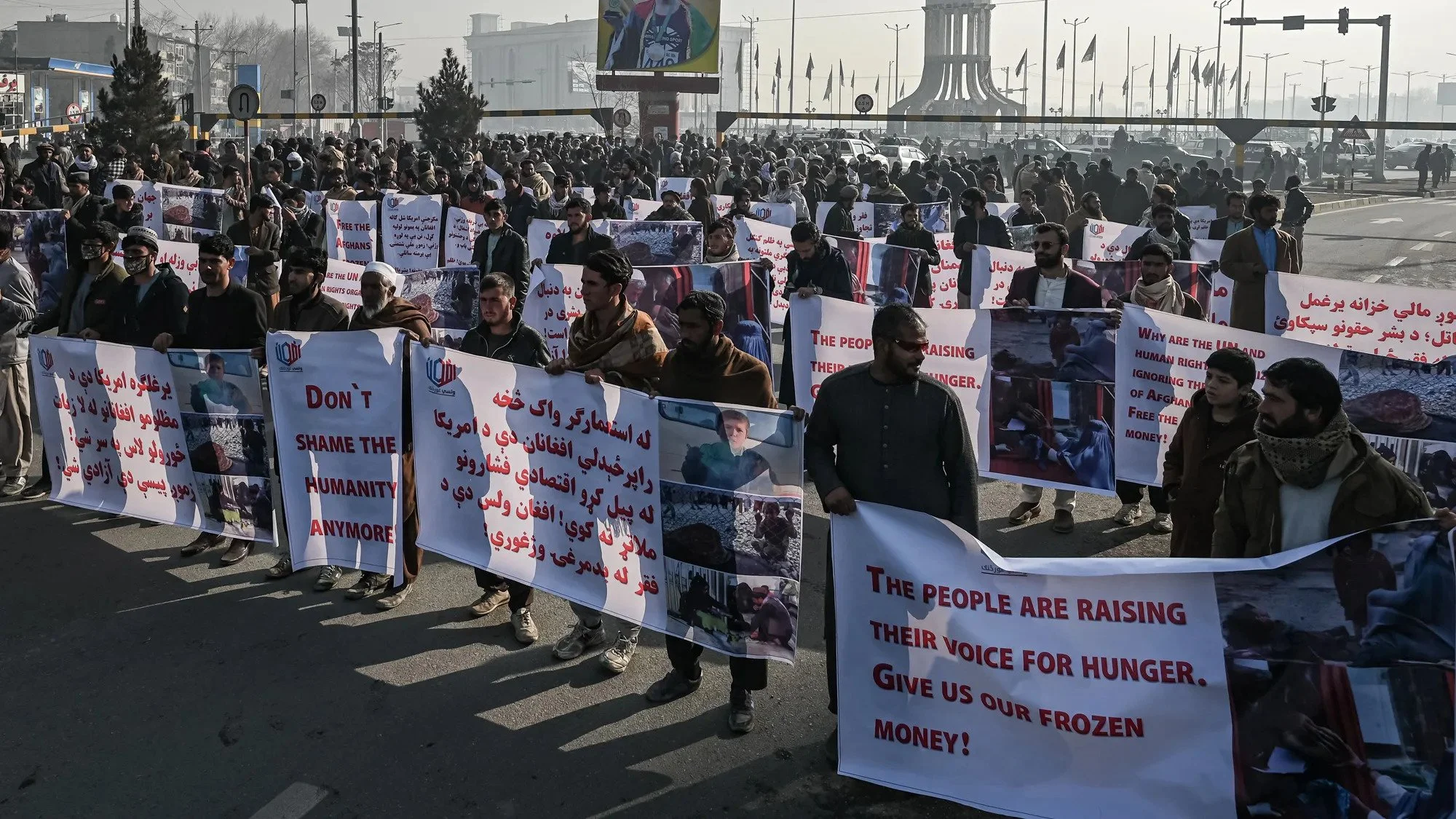The Price of Abandonment: Who is Paying for Afghanistan Sanctions
Photo: The Intercept
Argument by: Danielle Schmitz | February 24, 2025
With the rapid advance of Taliban forces following America’s departure from the region, Afghanistan has witnessed a dramatic reversal of human rights ever since. Public executions, forced disappearances, and brutal crackdowns on religious and political dissent are everyday occurrences. While the immediate fallout and the Taliban’s draconian interpretation of Sharia law has created human rights abuses, the imposition of U.S. sanctions has been a side effect of the withdrawal that has largely gone unnoticed.
America’s only response to its withdrawal, which marked the end of the twenty-year military presence, has been a main course of sanctions and a side of embargos. The sanctions, employed as an economic weapon against the Taliban, are now ammunition used against the people of Afghanistan. The rapid fall of Kabul in August 2021 underscored the failure of U.S. withdrawal policy. America drank coffee alongside the morning news as pictures of desperate Afghans clinging to departing aircraft, willing to risk their lives rather than face the Taliban’s rule, flashed on our screens. America’s disorganized exit symbolized the abandonment of a nation to chaos. No one was surprised as Ashraf Ghani, the Afghan president fled, commenting, “And what had happened 25 years ago in Afghanistan was going to happen again. I would have been hanged in front of the eyes of the people of Afghanistan and this would have been a dreadful disaster in our history”. America watched as history repeated itself.
As a result, Afghanistan’s economy, heavily dependent on international aid and foreign military presence, is caving in. The imposition of broad-based sanctions has further crippled the nation’s economy, pushing millions of Afghans into abject poverty and creating a severe humanitarian crisis. America’s knee-jerk, sanction-slapped reaction has worsened the economic crisis under the Taliban’s rule.
With the freezing of Afghan assets abroad and restrictions on financial transactions, the country has been all but cut off from the global financial system. The economic situation has led to hyperinflation, skyrocketing prices for basic goods, and a massive unemployment crisis. Additionally, the banking sector collapsed after the U.S. seized nearly 7 billion assets from the Afghan central bank. With the economy in freefall, women and children have been the biggest losers. The return of the Taliban’s rule has systematically dismantled the progress made on women’s rights. No longer can women go to school, university, or share a shred of freedom in the workplace. Child marriages are on the rise as families cope with economic insecurity and turn to selling their children to provide for basic necessities.
The Taliban’s rule is marked with a severe lack of accountability. The totalitarian regime is not occupied with the well-being of their citizens. There is no interest in providing for a healthy economy or civil society. The United States is putting a band-aid on a dam. Our sanctions have further removed any incentive to change. Now, as Afghanistan has been cut off from the international economy, the Taliban has turned to Russia for trade and investment.
America must stop and ask itself if sanctions are the only viable alternative to war. The economic power is in theory, supposed to target political power through trade and diplomatic restrictions, with the main goal of influencing behavior. But at what cost? In 1996, Madeleine Albright was quoted in an interview with Lesley Stahl on an episode of 60 Minutes about UN and U.S. sanctions towards Iraq: “I think this is a very hard choice, but the price-we think the price is worth it”. Seven years later, in 2003, she writes in her memoir, “I should have answered the question by reframing it and pointing out the inherent flaws in the premise behind it”.
Photo: Oriane Zerah for the IRC
Sanctions are a blunt tool used to punish the politically powerful and yet, history shows us that the economic weapon often hits ordinary citizens the hardest. Historically, not only in Iraq during the Gulf Wars, but also in Venezuela and Iran, the inconsistencies undermine the claim that sanctions are being done in the name of human rights. Since 1970, the U.S. imposed sanctions have been effective only 13% of the time.
Sanctions aren’t the cause of Afghanistan’s human rights crisis; the Taliban is. However, sanctions generate several negative externalities. They lead to a decline in GDP per capita, an increase in malnutrition, food insecurity, and poverty. The Taliban is in control and holds the cards to stop this human rights crisis, yet the current sanctions are exacerbating the situation.
The U.S. withdrawal from Afghanistan was a decision steeped in short-term political calculus and completely devoid of long-term vision and moral clarity. America must now confront its moral irresponsibility and failure to do what we said we would do in Afghanistan: Protect civilian freedoms in the fight against terrorism. The immediate aftermath has been nothing short of catastrophic, and the Afghan people have now been left to bear the brunt of this ill-conceived decision. Both UN and U.S. sanctions need humanitarian exemptions and safeguards for the private sector to restore the economy.
The United States’ hasty withdrawal and lack of substantive action afterward have inadvertently empowered the Taliban, providing them with a propaganda victory and solidifying their control over the country. The people of Afghanistan need hope under the Taliban rule, not a crippled economy. The U.S. cannot sit by and watch as a situation we fought to prevent for twenty years worsens. America’s fight may not be with a direct military presence, but it needs to be rooted in protecting the integrity of human rights. Broad sanctions will not work without a conjunction of a targeted approach and consideration for Afghan people America fought to protect.


